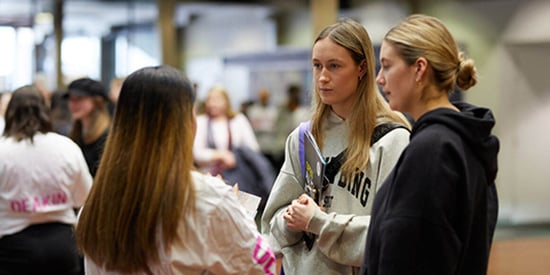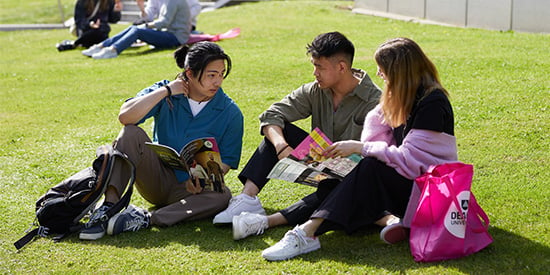Key facts
4 years full-time or part-time equivalent
Key dates
Direct applications to Deakin for Trimester 2 2024 close 23 June 2024
Direct applications to Deakin for Trimester 3 2024 close 27 October 2024
Current Deakin Students
To access your official course details for the year you started your degree, please visit the handbook
Course overview
Course information
- Award granted
Bachelor of Property and Real Estate/ Bachelor of Commerce
- Year
- 2017 course information
- Deakin code
- D325
- CRICOS code?
- 072834F Burwood (Melbourne)
- Approval status
- This course is approved by the University under the Higher Education Standards Framework.
- Australian Qualifications Framework (AQF) recognition
The award conferred upon completion is recognised in the Australian Qualifications Framework at Level 7.
Units
Bachelor of Commerce core units
Bachelor of Property and Real Estate core units
*previously coded MMP112
^previously coded MMP214
Common core units
Plus an 8 credit point Bachelor of Commerce major sequence
Plus completion of 4 credit points of elective units (which may include a Bachelor of Property and Real Estate major sequence)
Intakes by location
The availability of a course varies across locations and intakes. This means that a course offered in Trimester 1 may not be offered in the same location for Trimester 2 or 3. Check each intake for up-to-date information on when and where you can commence your studies.
Deakin splits the academic year into three terms, known as trimesters. Most students usually undertake two trimesters each year (March-June, July-November).
Additional course information
| Deakin Graduate Learning Outcomes (DGLOs) | Course Learning Outcomes (CLOs) | Minimum Standards | |
| 1. Discipline-specific knowledge and capabilities: appropriate to the level of study related to a discipline or profession. |
- Demonstrable in-depth knowledge of scientific methods and tools, and
|
|
|
| 2. Communication: using oral, written and interpersonal communication to inform, motivate and effect change. |
|
|
|
| 3. Digital literacy: using technologies to find, use and disseminate information. |
|
|
|
| 4. Critical thinking: evaluating information using critical and analytical thinking and judgment. |
|
|
|
| 5. Problem solving: creating solutions to authentic (real world and ill-defined) problems. |
|
|
|
| 6. Self-management: working and learning independently, and taking responsibility for personal actions. |
|
|
|
| 7. Teamwork: working and learning with others from different disciplines and backgrounds. |
|
|
|
| 8. Global citizenship: engaging ethically and productively in the professional context and with diverse communities and cultures in a global context |
|
|
|
Approved by Faculty Board: 28 July 2016
Please note:The eligibility of students for membership of the accrediting body is subject to meeting the requirements of that body and that Deakin makes no representations that individuals will meet those requirements.
Workload
As a student in the Faculty of Business and Law, you can expect to participate in a range of teaching activities each week. This could include classes, seminars, practicals and online interaction. You can refer to the individual unit details in the course structure for more information. You will also need to study and complete assessment tasks in your own time.
Need help?
Ask a question about studying at Deakin
Entry requirements
Scholarship options
A Deakin scholarship could help you pay for your course fees, living costs and study materials. If you've got something special to offer Deakin - or maybe you just need a bit of extra support - we've got a scholarship opportunity for you. Search or browse through our scholarships
Apply now
Applications for Trimester 1, 2025 open in August. Each year, thousands of students prepare for uni with the help of Deakin support services. We offer a huge range of support, including one-on-one consultations, webinars, online resources and events throughout the year.
Some of our courses have limited places available - for the latest on courses still open for application, visit Courses by trimester.
Create an account in the Deakin Application Portal, start your application, enter personal details, education experience, upload supporting documents and submit. Need help? Play this video, or contact one of our friendly future student advisers on 1800 693 888 or submit an online enquiry.
Entry pathways
View pathways into the Bachelor of Property and Real Estate/Bachelor of Commerce with our pathways finder.
Contact information
Faculty of Business and Law - student advisers
Tel 03 9244 6555
Email buslaw@deakin.edu.au
Course learning outcomes
Deakin's graduate learning outcomes describe the knowledge and capabilities graduates can demonstrate at the completion of their course. These outcomes mean that regardless of the Deakin course you undertake, you can rest assured your degree will teach you the skills and professional attributes that employers value. They'll set you up to learn and work effectively in the future.
Please refer to the Course Learning Outcomes (CLOs) of each of the single degrees.




